Mises, Ludwig von. Human Action: A Treatise on Economics
Подождите немного. Документ загружается.

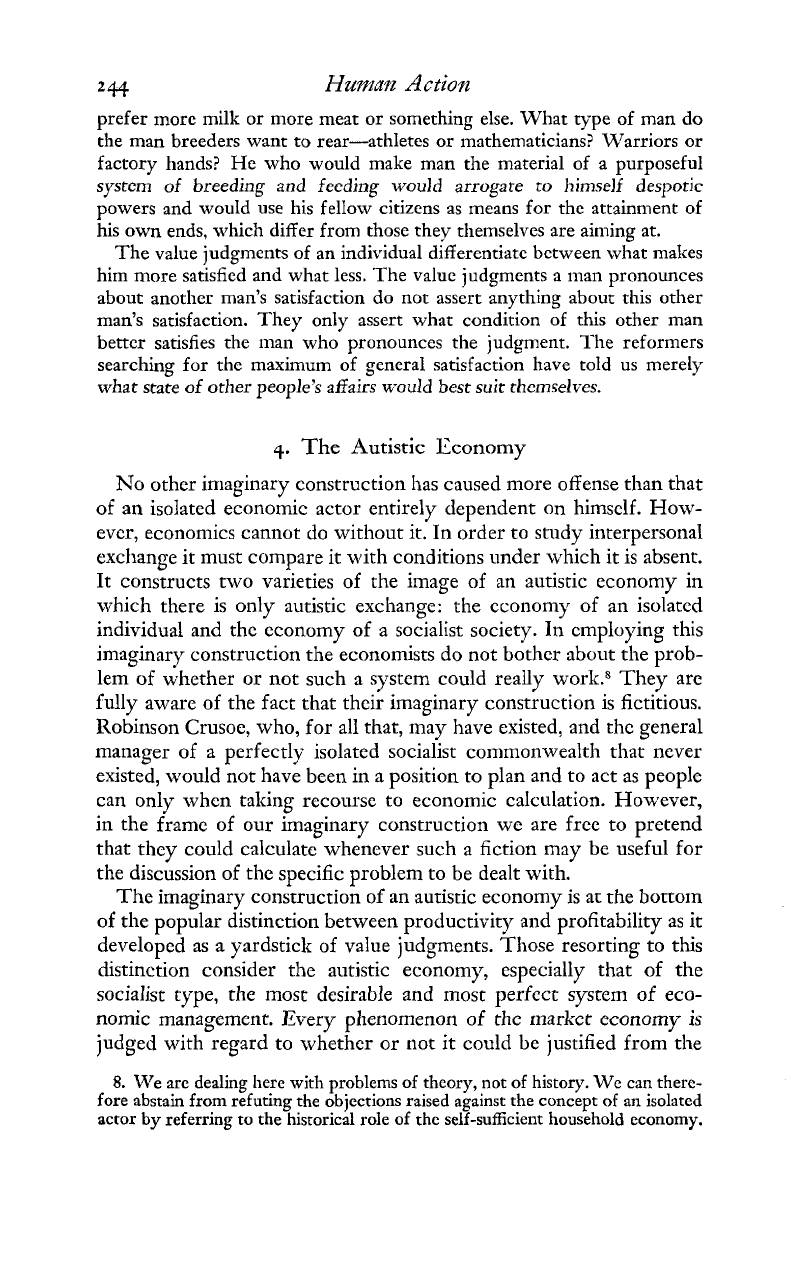
244 Humm
Action
prefer more milk or more meat or something else. What type of man do
the man breeders want to rear-athletes or mathematicians? U7arriors or
factory hands?
He
who would make man the material of a purposeful
system of breeding
and
feeding
would
arrogate
to
himself
despotic
powers and would use his felIow citizens as means for the attainment of
his own ends, which differ from those they themselves are aiming at.
The value judgments of an individual differentiatc between what makes
him more satisfied and what less. The valuc judgments a man pronounces
about: another man's satisfaction do not assert anything about this other
man's satisfaction. They only assert what condition of this other man
better satisfies the man who pronounces the judgment. The reformers
searching for the maximum of general satisfaction have told us merely
what state
of
other people's affairs
would
best suit themselves.
q.
The
Autistic
Economy
No other imaginary construction has caused more offense than that
of an isolated economic actor entirely dependent on himsclf. How-
ever,
economics cannot do without it. In order to study interpersonal
exchange it must compare it with conditions under which it is absent.
It constructs two varieties of the image of an autistic economy in
which there is only autistic exchange: the cconomy of an isolated
individual and the economy of a socialist society. In cmploying this
imaginary construction the economists do not bother about the prob-
lem of 6.hether or not such a system could really They are
fully aware of the fact that their imaginary construction is fictitious.
Robinson Crusoe, who, for all that, may have existed, and thc general
manager of a perfectly isolated socialist commonwealth that never
existed, would not have been in
a
position to plan and to act as people
can only whcn taking recourse to economic calculation. However,
in the frame of our imaginary construction wc are free to pretend
that they could calculate whenever such a fiction may be useful for
the discussion of the specific problem to be dealt with.
The imaginary construction of an autistic economy is at the bottom
of the popular distinction between productivity and profitability as it
developed as
a
yardstick of value judgments. Those resorting to this
distinction consider the autistic economy, especially that of the
socialist type, the most desirable and most perfect system of eco-
nomic management. Every phenomenon of the market economy
is
judged with regard to whether or not it could be justified from the
8.
We are dealing here with problems of theory,
not
of history. We can there-
fore abstain from refuting
the
objections raised against the concept of
an
isolated
actor
by
referring to the historical role of
the
self-sufficient household economy.
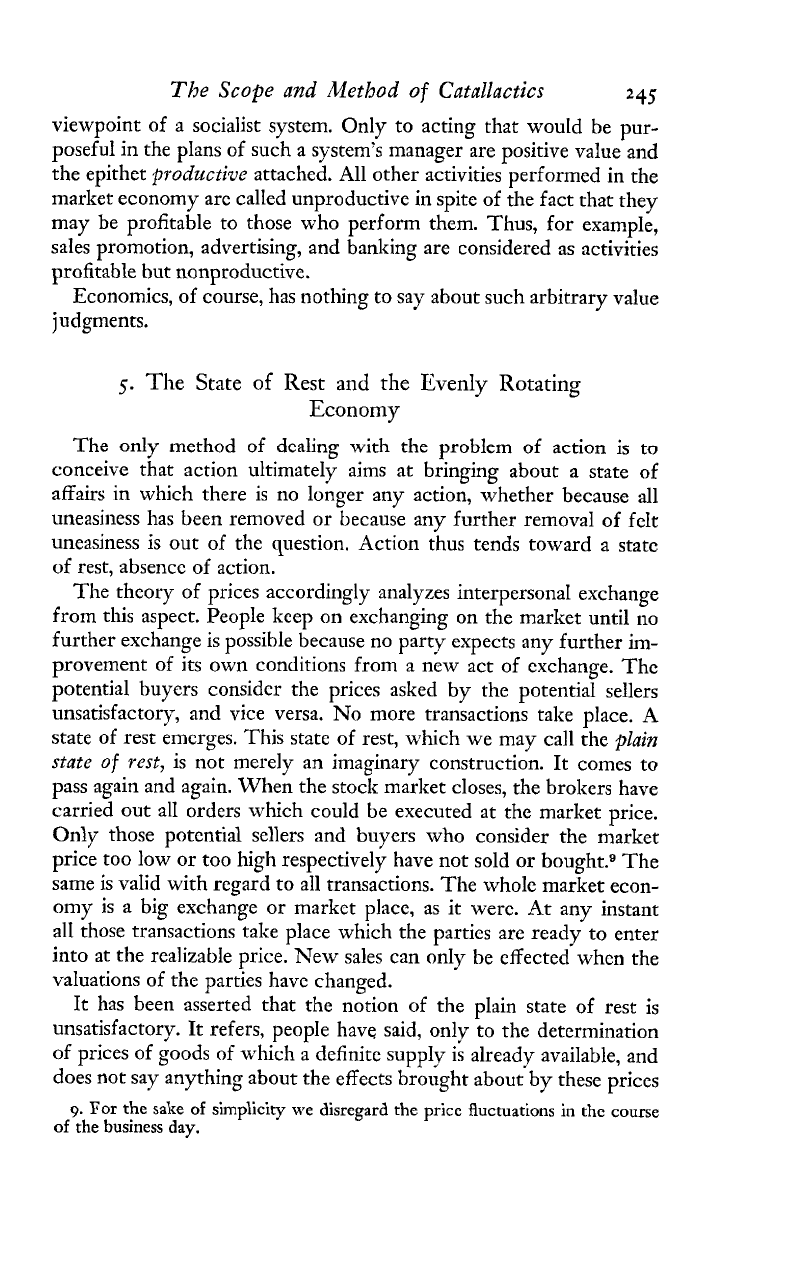
The
Scope
and
Method
of
Catallactics
245
viewpoint of a socialist system. Only to acting that would be pur-
poseful in the plans of such
a
system's manager are positive value and
the epithet
prodz~ctive
attached. All other activities performed in the
market economy are called unproductive in spite of the fact that they
may
be profitable to those who perform them. Thus, for example,
sales promotion, advertising, and banking are considered as activities
profitable but nonproductive.
Economics, of course, has nothing to say about such arbitrary value
judgments.
5.
The
State
of Rest
and
the
Evenly
Rotating
The only method of dealing with the problem of action is to
conceive that action ultimately aims at bringing about a state of
affairs in which there is no longer any action, whether because all
uneasiness has been removed or because any further removal of feIt
uneasiness is out of the question. Action thus tends toward
a
state
of rest, absencc of action.
The
thcory of prices accordingly analyzes interpersona1 exchange
from this aspect. People keep on exchanging on the market until no
further exchange is ~ossible because no party expects any further im-
provement of its own conditions from a new act of exchange. The
potential buyers consider the prices asked by the potential sellers
unsatisfactory, and vice versa. No more transactions take place.
A
state of rest emerges. This state of rest, which we may call the
plain
state
of rest,
is not merely an imaginary construction. It comes to
pass again and again. When the stock market closes, the brokers have
carried out a11 orders which could be executed at the market price.
Only those potential sellers and buycrs who consider the market
price too low or too high respectively have not sold or bo~ght.~ The
same is vaIid with regard to all transactions. The whole market econ-
omy is a big exchange or markct place, as it werc. At any instant
all those transactions take place which the parties are ready to enter
into at the realizable price. New sales can only be effected whcn the
vahations of thc parties have changed.
It has been asserted that the notion of the plain state of rest is
unsatisfactory.
It
refers, people have, said, only to the determination
of prices of goods of which a definite supply is already available, and
does not say anything about the effects brought about by these prices
9.
For
the sake of simplicity
we
disregard the
price
fluctuations
in
thc
course
of
the business
day.
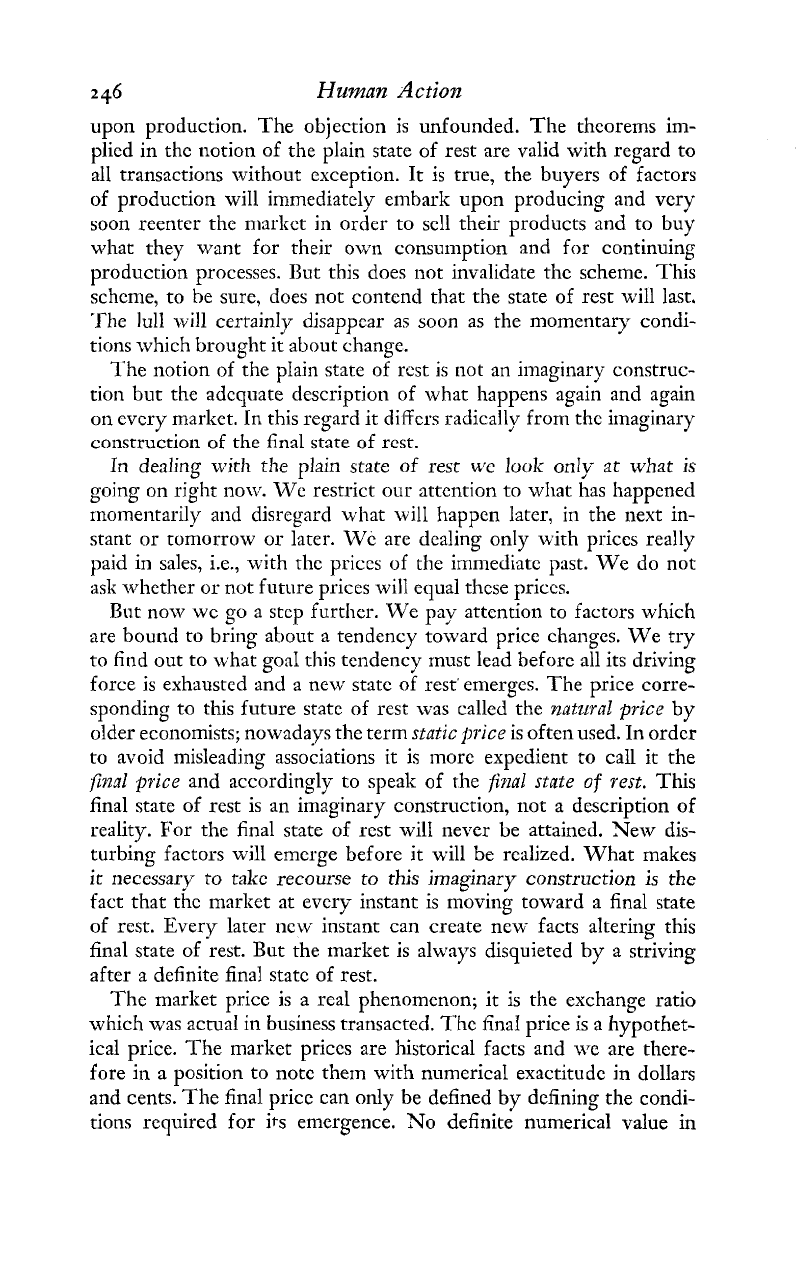
Human
Action
upon production. The objection is unfounded. The theorems im-
plied in the notion of the plain state of rest are valid with regard to
all transactions without exception. It is true, the buyers of factors
of production will immediately embark upon producing and very
soon reenter the market in order to sell their products and to buy
what they want for their own consumption and for continuing
production processes. I3ut this does not invalidate the scheme. This
scheme, to be sure, does not contend that the state of rest will last.
'The lull will certainly
disappear
as soon as the momentary condi-
tions which brought it about change.
The notion of the plain state of rcst is not an imaginary construc-
tion but the adequate description of what happens again and again
on evcry marltet. In this regard it differs radically from the imaginary
construction of the final state of rest.
In
dealing with the plain state of rest ure look only at what is
going on right nonr. We restrict our attention to what has happened
momentarily
and disregard what
will
happen later, in the next in-
stant or tomorrow or later. We are dealing only with prices really
paid in sales, i.e., with the prices of the immediate past. We do not
ask whether or not future prices
will
equal these prices.
Bat now wc go a step further. We pay attention to factors which
are bound to bring ahout a tendency toward price changes. We try
to find out to what god this tendency rnust lead before all its driving
force is exhausted and a new state of rest'emergcs. The price corre-
sponding to this future statc of rest was called the
natural price
by
older economists; nowadays the term
static price
is often used. In order
to avoid misleading associations it is more expedient to call it the
final
price
and accordingly to speak of the
\ha1 state
of
rest.
This
final state of rest is an imaginary construction, not a description of
reality. For the final state of rcst will never be attained. New dis-
turbing factors will emerge before it will be realized. What makes
it
necessary to take recourse to this imaginary construction is the
fact that the marlret at every instant is moving toward a final state
of rest. Every later new instant can create new facts altering this
final state of iest. But the market is always disquieted by a striving
after
a
definite final statc of rest.
The market price is a real phenomenon; it is the exchange ratio
which was actual in business transactecf. The final price is a hypothet-
ical price. The market prices are historical facts and we are there-
fore in a position to note them with numcricaI exactitude in dollars
and cents. The final price can only be defined by defining the condi-
tions required for its emergence. No definite numerical value in
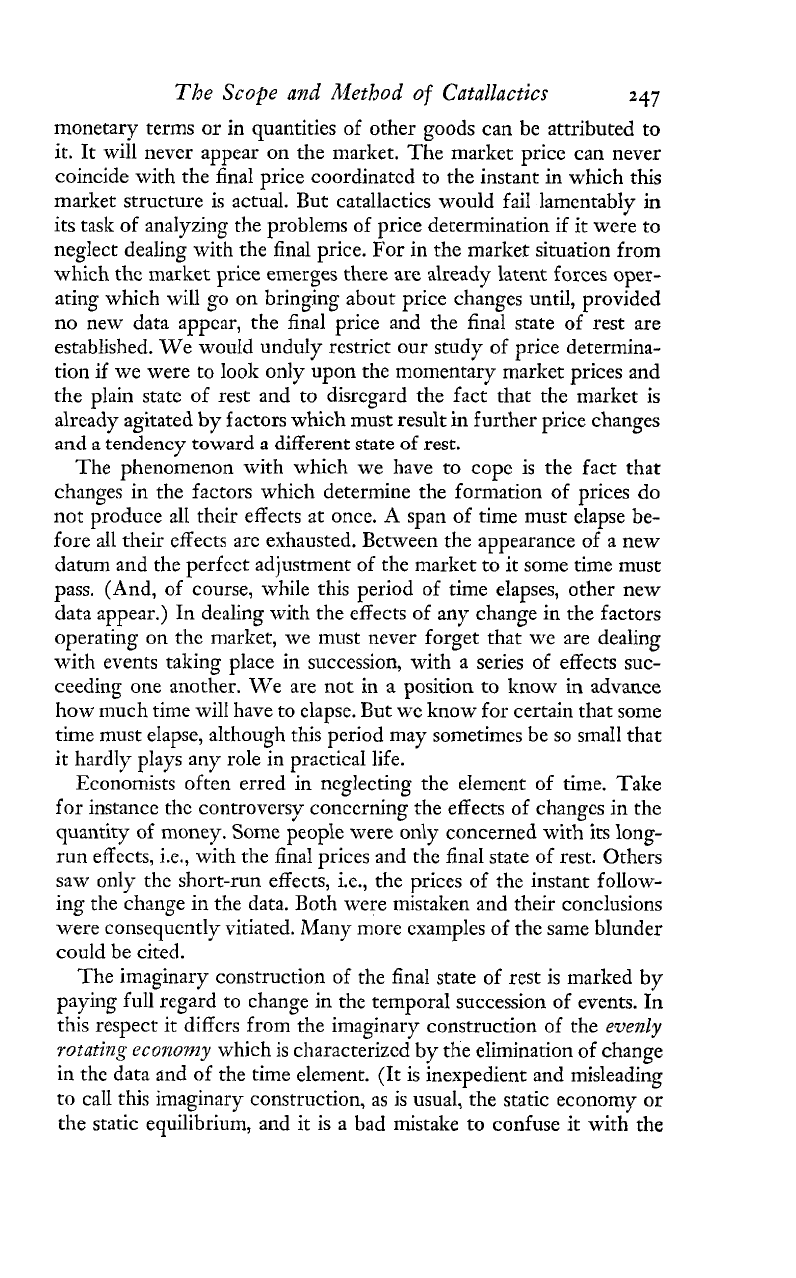
The
Scope
and A4ethod of Catallactics
247
monetary terms or in quantities of other goods can be attributed to
it. It wiil nevcr appear on the market. The market price can never
coincide with the final price coordinated to the instant in which this
market structure is actual. But catallactics would faiI lamentably in
its task of analyzing the problems of price determination if it were to
neglect dealing with the final price. For in the market situation from
which the market price emerges there
are already
latent forces oper-
ating which will go on bringing about price changes until, provided
no new data appear, the final price and the final state of rest are
established. We wouId unduly restrict our study of price determina-
tion if we were to loolr only upon the momentary market prices and
the plain state of rest and to disregard the fact that the market is
already agitated by factors which must result in further price changes
and a tendency toward
a
different state of rest.
The phenomenon with which we have to cope is the fact that
changes in the factors which determine the formation of prices do
not produce a11 their effects at once.
A
span of time must elapse be-
fore all their effects are exhausted. Between the appearance of a new
datum and the perfect adjustment of the market to it some time must
pass. (And, of course, while this period of time elapses, other new
data appear.) In dealing with the effects of any change in the factors
operating on the market,
we
must never forget that we are dealing
with events taking place in succession, with a series of effects suc-
ceeding one another. We are not in a position to know in advance
how much time will have to elapse. But we know for certain that some
time must elapse, although this period may sometimes be so smaIl that
it hardly plays any role in practical life.
Economists often erred in neglecting the element of time. Take
for instance the controvcrsy concerning the effects of changes in the
quantity of money. Some people were only concerned with its long-
run effects, i.e., with the final prices and the final state of rest. Others
saw only the short-run effects, i.c., the prices of the instant follow-
ing the change in the data. Both were mistaken and their conclusions
were consequently vitiated. Many more cxamples of the same blunder
could be cited.
The imaginary construction of the final state of rest is marked by
paying full regard to change in the temporal succession of events. In
this respect it diffcrs from the imaginary construction of the
evenly
rotating
economy
which is characterized by the elimination of change
in the data and of the time element. (It is inexpedient and misleading
to call this imaginary construction, as is usual, the static economy or
the static equilibrium, and it is a bad mistake to confuse it with the
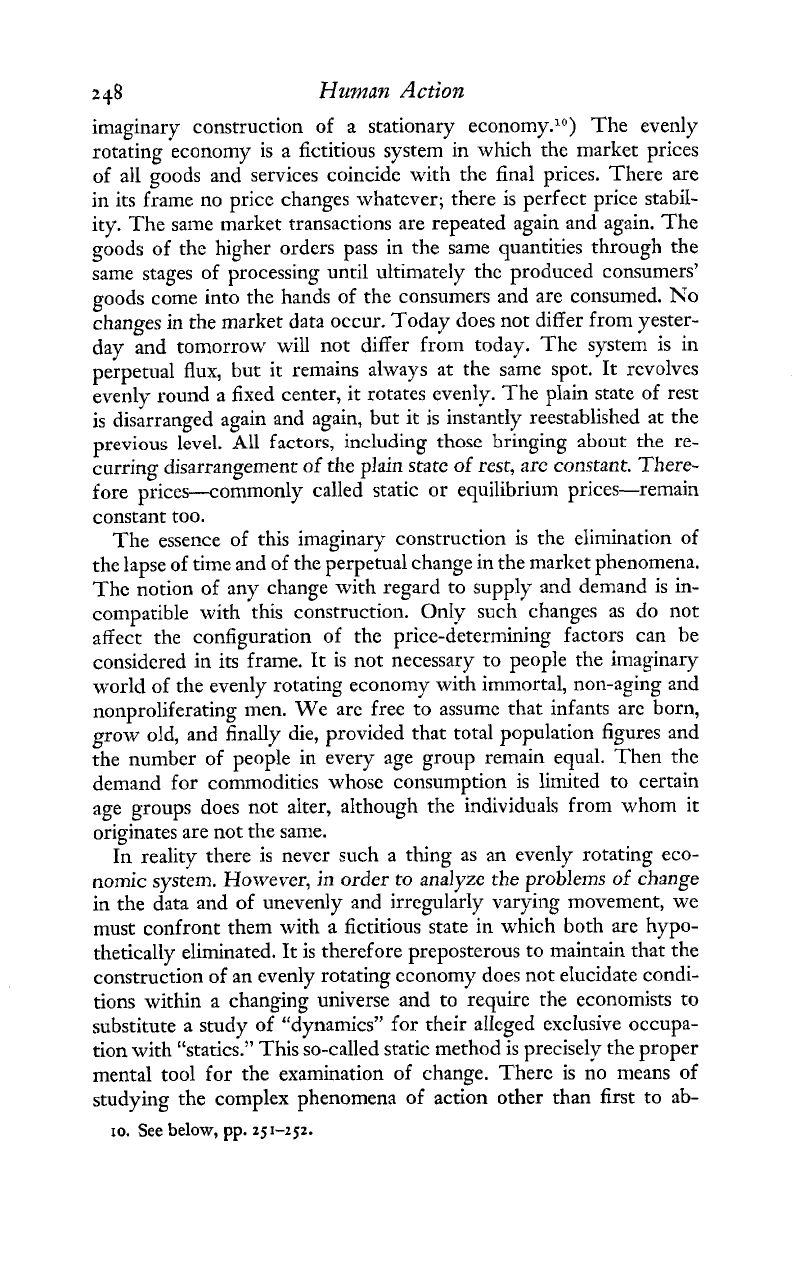
248
Human
Action
imaginary construction of a stationary economy.lO) The evenly
rotating economy is
a
fictitious system in which thc market prices
of all goods and services coincide with the final prices. There are
in its frame no price changes whatever; there is perfect price stabil-
ity. The same market transactions are repeated again and again. The
goods of thc higher orders pass in the same quantities through the
same stages of processing until ultimatcly the produced consumers'
goods come into the hands of the consumers and are consumed. No
changes in the market data occur. Today does not differ from yester-
day and tomorrow will not differ from today. The system is in
perpetual flux, but it remains always at the same spot. It revolves
evenly round a fixed center, it rotates evenly. The plain state of rest
is disarranged again and again, but it is instantly reestablished at the
previous level. All factors, including thosc bringing about the re-
curring disarrangement of the
plain
state of rest, arc comtant.
There-
fore prices--commonly called static or equilibrium prices-remain
constant too.
The essence of this imaginary construction is the elimination of
the lapse of time and of the perpetual change in the market phenomena.
The notion of any change with regard to supply and demand is in-
compatible with this construction. Only such changes as do not
affect the configuration of the price-determining factors can be
considered in its frame.
It
is not necessary to people the imaginary
world of the evenly rotating economy with immortal, non-aging and
nonproliferating men.
We
are free to assume that infants are born,
grow old, and finally die, provided that total population figures and
the number of people in every age group remain equal. Then the
demand for commodities whose consumption is limited to certain
age groups does not alter, although the individuals from whom it
originates are not the same.
In reality there is never such a thing as an evenly rotating eco-
nomic system. However,
in
order
to
analyze
the
prol.&rns of
change
in the data and of unevenly and irregularly varying movement, wc
must confront them with
a
fictitious state in which both are hypo-
thetically eliminated. It is therefore preposterous to maintain that the
construction of an evenly rotating economy does not elucidate condi-
tions within a changing universe and to require the economists to
substitute a study of "dynamics" for their alleged exclusive occupa-
tion with "statics." This so-called static method is precisely the proper
mental tool for the examination of change. There is no means of
studying the complex phenomena of action other than first to ab-
10.
See
below,
pp.
251-252.
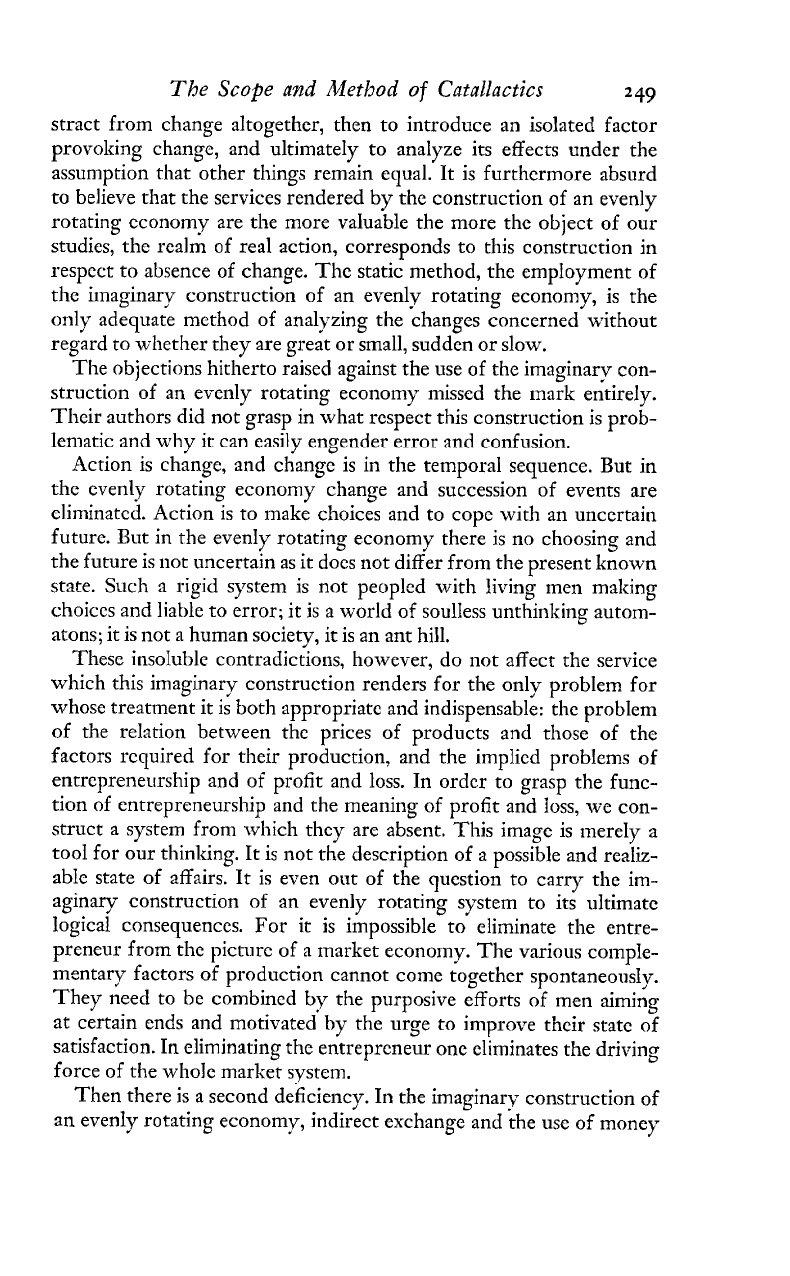
The Scope and Method
of
Catallactics
2
49
stract from change altogether, then to introduce an isolated factor
provoking chzngc, and ultimately to analyze its effects under the
assun~ption that other things remain equal. It is furthermore absurd
to believe that the services rendered by the construction of an evenly
rotating economy are the more valuable the more the object of our
studies, the real~i of real action, corresponds to this construction in
respect to absence of change. The static method, the employment of
the imaginary construction of an evenly rotating economy, is the
only adequate method of analyzing the changes concerned without
regard to w-hether they are great or small, sudden or slow.
The objections hitherto raised against the use of the imaginary con-
struction of an evenly rotating economy missed the mark entirely.
Their authors did not grasp in what respect this construction is prob-
lematic and why it can easily engender error and confusion.
Action is change, and change is in the temporal sequence. But in
the evenly rotating economy change and succession of events are
climinated. Action is to make choices and to cope with an uncertain
futurc. But in the evenly rotating economy there is no choosing and
the future is not uncertain as it docs not differ from the present known
state. Such a rigid system is not peopled with living men malting
choices and liable to error; it is a world of soulless unthinking autom-
atons; it is not a human society, it is an ant hill.
These itlsoIuble contradictions, however, do not affect the service
which this imaginary construction renders for the only problem for
whose treatment it is both appropriate and indispensable: the problem
of the relation between the prices of products and those of the
factors required for their production, and the implied problems of
entrepreneurship and of profit and loss. In order to grasp the func-
tion
of
entrepreneurship and the meaning of profit and loss,
wc
con-
struct a system from which they are absent. This image is merely a
tool for our thinking. It is not the description of a possible and realiz-
able state of affairs. It is even out of the question
to
carry the im-
aginary construction of an evenly rotating system to its ultimate
logical consequences. For it is impossible to eliminate the entre-
preneur from the picture of a rnarket economy. The various comple-
mentary factors of production cannot come together spontaneously.
They need to be combined
by
the purposive efforts of men aiming
at certain ends and motivated'by the urge to improve their state of
satisfaction. In eliminating
the
entrepreneur one eliminates the driving
force of the whole market system.
Then there is a second deficiency. In the imaginarv construction of
an evenly rotating economy, indirect exchange and the use of money
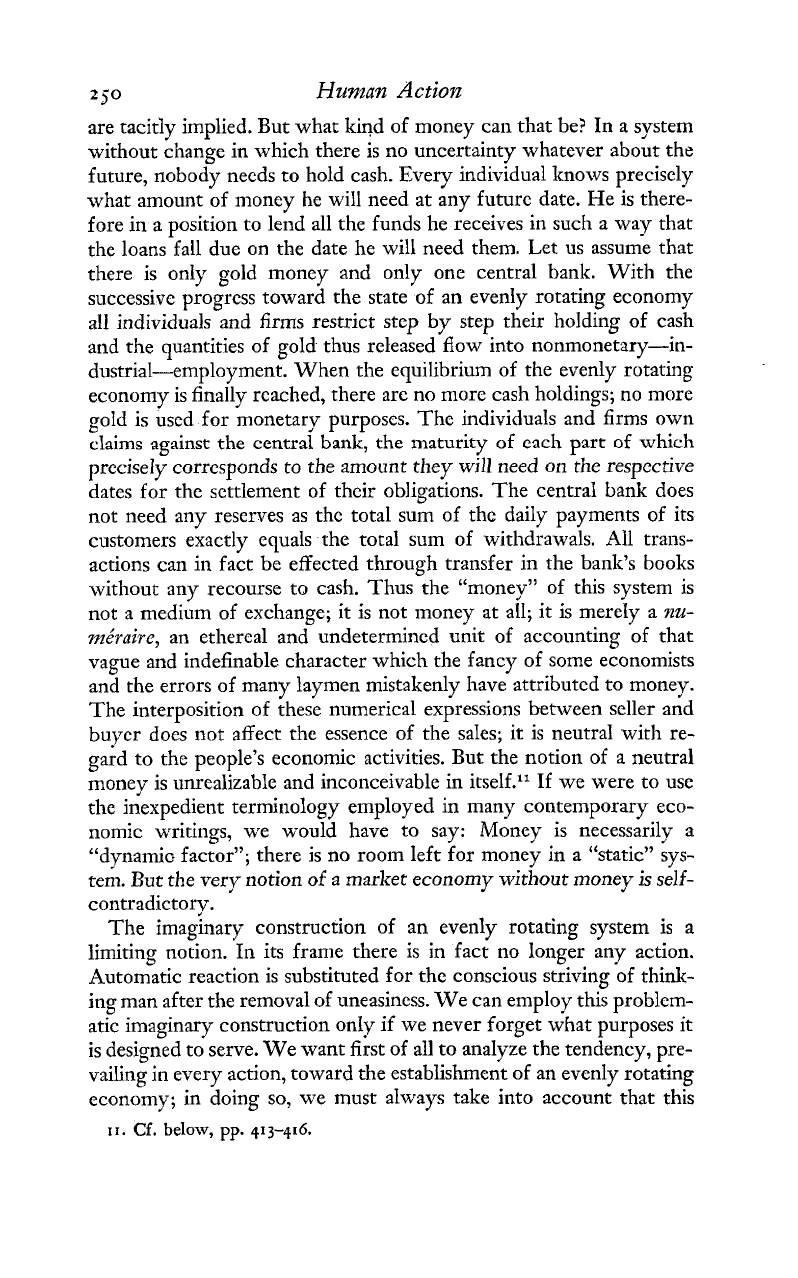
z
jo
Human
Action
are tacitly implied. But what kind of money can that be? In a system
without change in which there
is
no uncertainty whatever about the
future, nobody needs to hold cash. Every individual knows precisely
what amount of money he will need at any future date. He is there-
fore in a position to lend all the funds he receives in such a way that
the loans fall due on the date he will need them. Let us assume that
there is only gold money and only one central bank. With the
successive progress toward the state of an evenly rotating economy
all individuals and firms restrict step by step their holding of cash
and the quantities of gold thus released flow into nonmonetary-in-
dustrial-employment. When the equilibrium of the evenly rotating
economy is finally rcached, there are no more cash holdings; no more
gold is used for monetary purposes. The individuals and firms own
claims against the central bank, the maturity of each part of which
precisely
corresponds
to the amount they
will
need
on
the respective
dates for the settlement of thcir obligations. The central bank does
not need any reserves as the total sum of the daily payments of its
customers exactly equals the total sum of withdrawals. All trans-
actions can in fact be effected through transfer in the bank's books
without any recourse to cash. Thus the "money" of this system is
not a medium of exchange; it is not money at all; it is mereiy a
nu-
me'rai~e,
an ethercal and undetermined unit of accounting of that
vague and indefinable character which the fancy of some economists
and the errors of many laymen mistakenly have attributcd to money.
The interposition of these numerical expressions between seller and
buyer does not affect the essence of the saIes; it is neutral with re-
ga;d to the people's economic activities. But the notion of a neutral
money is unrealizable and inconceivable in itself.'* If we were to use
the inexpedient terminology employed in many contemporary eco-
nomic writings, we would have to say: Money is necessarily
a
"dynami~ factor"; there is no room left for money in a "static" sys-
tem. But the very notion of a market economy without money
is
self-
contradictory.
The imaginary construction of an evenly rotating system is a
limiting notion. In its frame there is
in
fact no longer
any
action.
Automatic reaction is substituted for the conscious striving of think-
ing man after the removal of uneasiness. We can employ this problem-
atic imaginary construction only if we never forget what purposes it
is designed to serve. We want first of all to analyze the tendency, pre-
vailing in every action, toward the establishment of an evenly rotating
economy; in doing so, we must always take into account that this
I
r.
Cf.
below,
pp.
413-416.
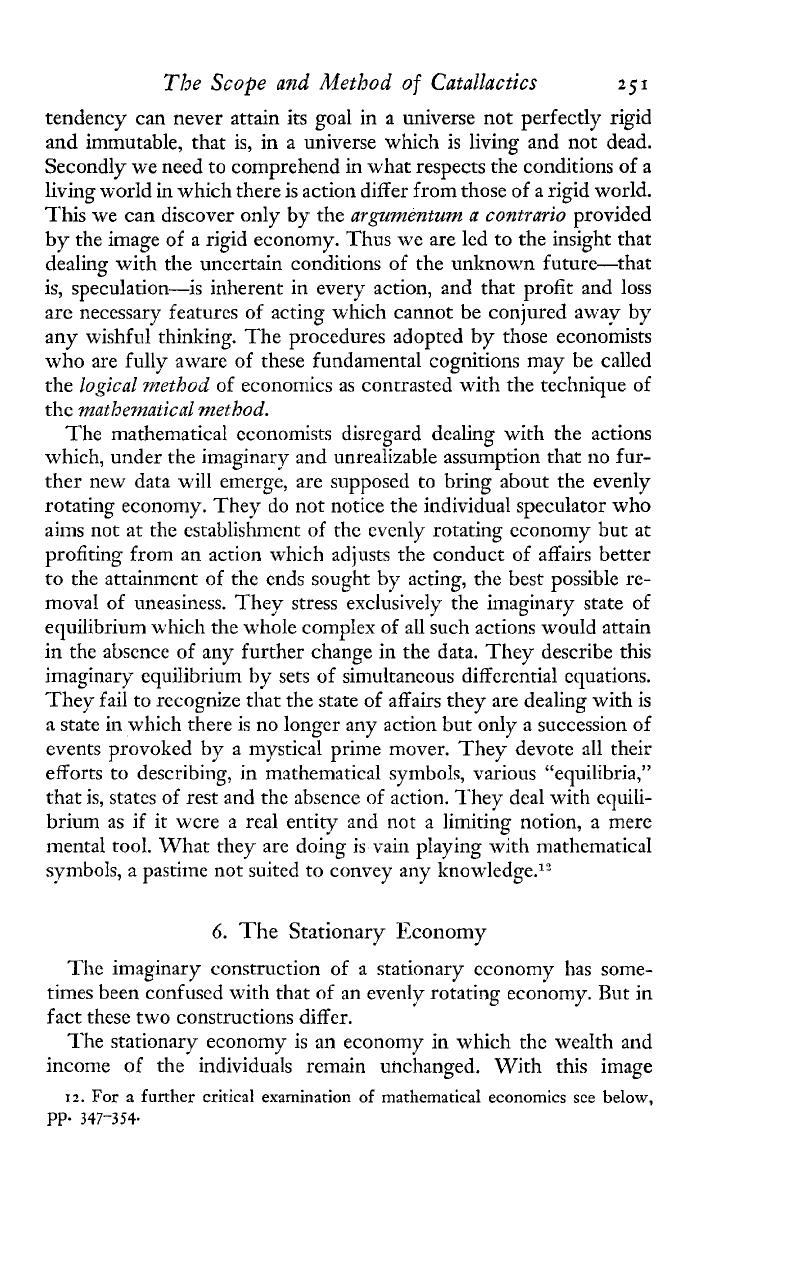
The Scope
and
Method of
CataElactics
25
1
tendency can never attain its goal in a universe not perfectly rigid
and immutable, that is, in a universe which is living and not dead.
Secondly
we
need to comprehend in what respects the conditions of a
living world in which there is action differ from those of a rigid world.
This we can discover only by the
argumenturn
a
contrario
provided
by the image of a rigid economy. Thus we are led to the insight that
dealing with the uncertain conditions of the unltnown future-that
is, speculation-is inherent in every action, and that profit and loss
are necessary features of acting which cannot be conjured away by
any wishful thinking. The procedures adopted by those economists
who are fully aware of these fundamental cognitions may be called
the
logical method
of economics as contrasted with the technique of
the
mathema~ical method.
The mathematical economists disregard dealing with the actions
which, under the imaginary and unrealizable assumption that no fur-
ther new data will emerge, are supposed to bring about the evenly
rotating economy. They do not notice the individual speculator who
aims not at the establishment of the evenly rotating economy hut at
profiting from an action which adjusts the conduct of affairs better
to the attainment of the ends sought
by
acting, the best possible re-
moval of uneasiness. They stress excl~;sivel~ the imaginary state of
equilibrium which the whole complex of all such actions would attain
in the absence of any further change in the data. They describe this
imaginary equilibrium by sets of simultaneous differential equations.
They fail to recognize that the state of affairs they are dealing with is
a state in which there is no longer any action but only a succession of
events provoked by a mystical prime mover. They devote all their
efforts to describing, in mathematical symbols, various "equilibria,"
that is, states of rest and the absence of action. They deal with equili-
brium as if it were a real entity and not
a
limiting notion, a mere
mental tool. What they are doing is vain playing with mathematical
symbols,
a
pastime not suited to convey any 1tnowledge.l2
6.
The
Stationary Economy
The imaginary construction of a stationary economy has some-
times been confused with that of an evenly rotating economy. Rut in
fact these two constructions differ.
The stationary economy is an economy in which the weaIth and
income of the individuals remain unchanged. With this image
12.
For
a
further critical examination of mathematical economics see below,
pp-
347-354-
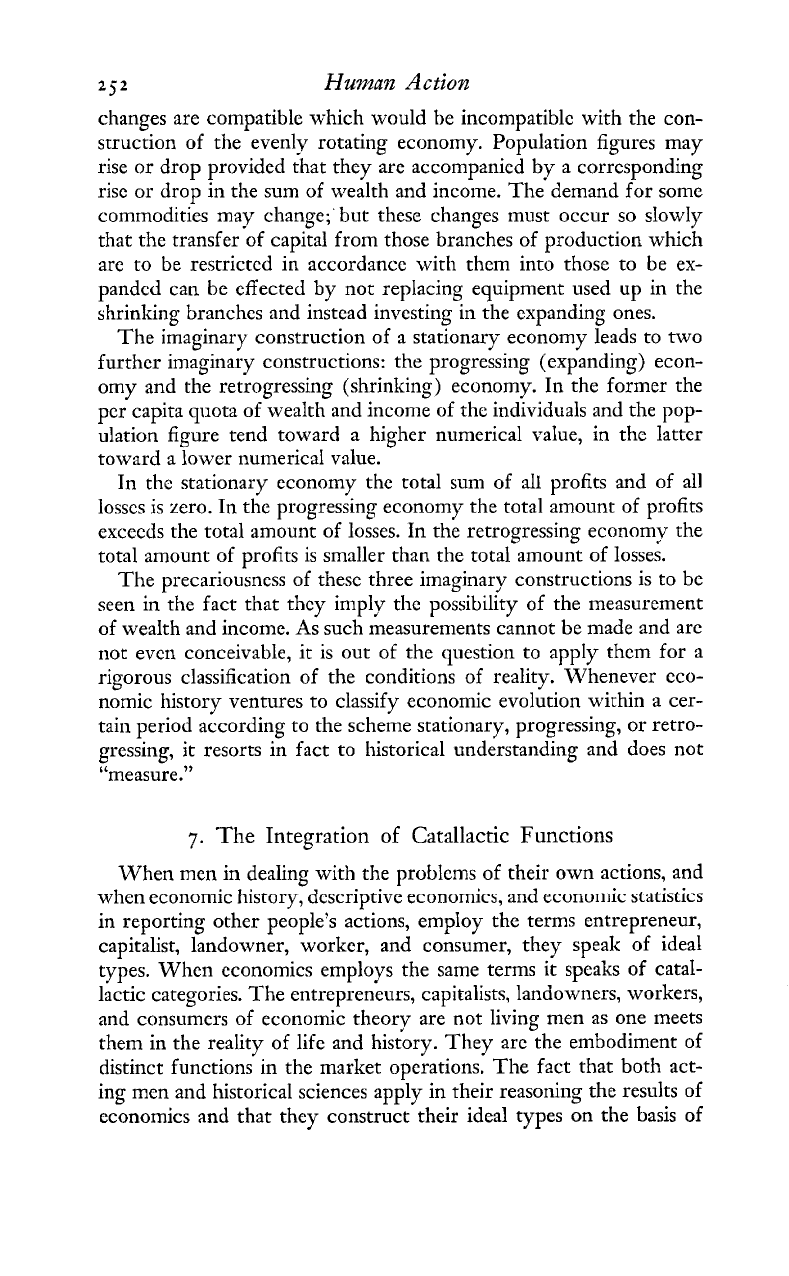
2
j2
Human
Action
changes are compatible which would be incompatible with the con-
struction of the evenly rotating economy. Population figures may
rise or drop provided that they are accompanied by a corresponding
rise or drop in the sum of wealth and income. The demand for some
commodities may change; but these changes must occur so slowly
that the transfer of capital from those branches of production which
are to be restricted in accordance with them into those to be ex-
panded can be effected by not replacing equipment used up in the
shrinking branches and instead investing in the expanding ones.
The imaginary construction of a stationary economy leads to two
further imaginary constructions: the progressing (expanding) econ-
omy and the retrogressing (shrinking) economy. In the former the
per capita quota of wealth and income of the individuals and the pop-
ulation figure tend toward a higher numerical value, in thc latter
toward a lower numerical value.
In thc stationary economy the total sum of
all
profits and of all
losses is zero. In the progressing economy the total amount of profits
exceeds the total amount of losses. In the retrogressing economy the
total amount of profits is smaller than the total amount of losses.
The precariousness of these three imaginary constructions is to be
seen in the fact that they inlply the possibility of the measurement
of
wealth and income. As such measurements cannot be made and are
not even conceivable, it is out of the question to apply them for a
rigorous classification of the conditions of reality. Whenever eco-
nomic history ventures to classify economic evolution within a cer-
tain period according to the scheme stationary, progressing, or retro-
gressing, it resorts in fact to historical understanding and does not
"mea~ure.~'
7.
The
Integration of Catallactic Functions
When men in dealing with the problems of their own actions, and
when economic hisrory, descriprive economics,
and
econu~ilic
statistics
in reporting other people's actions, employ the terms entrepreneur,
capitalist, landowner, worker, and consumer, they speak of ideal
types. When economics employs the same terms
it
speaks of cataI-
lactic categories. The entrepreneurs, capitalists, landowners, workers,
and consumers of economic theory are not living men as one meets
them in the reality of life and history. They are the embodiment of
distinct functions in the market operations. The fact that both act-
ing men and historical sciences apply in their reasoning the results of
economics and that they construct their ideal types on the basis of
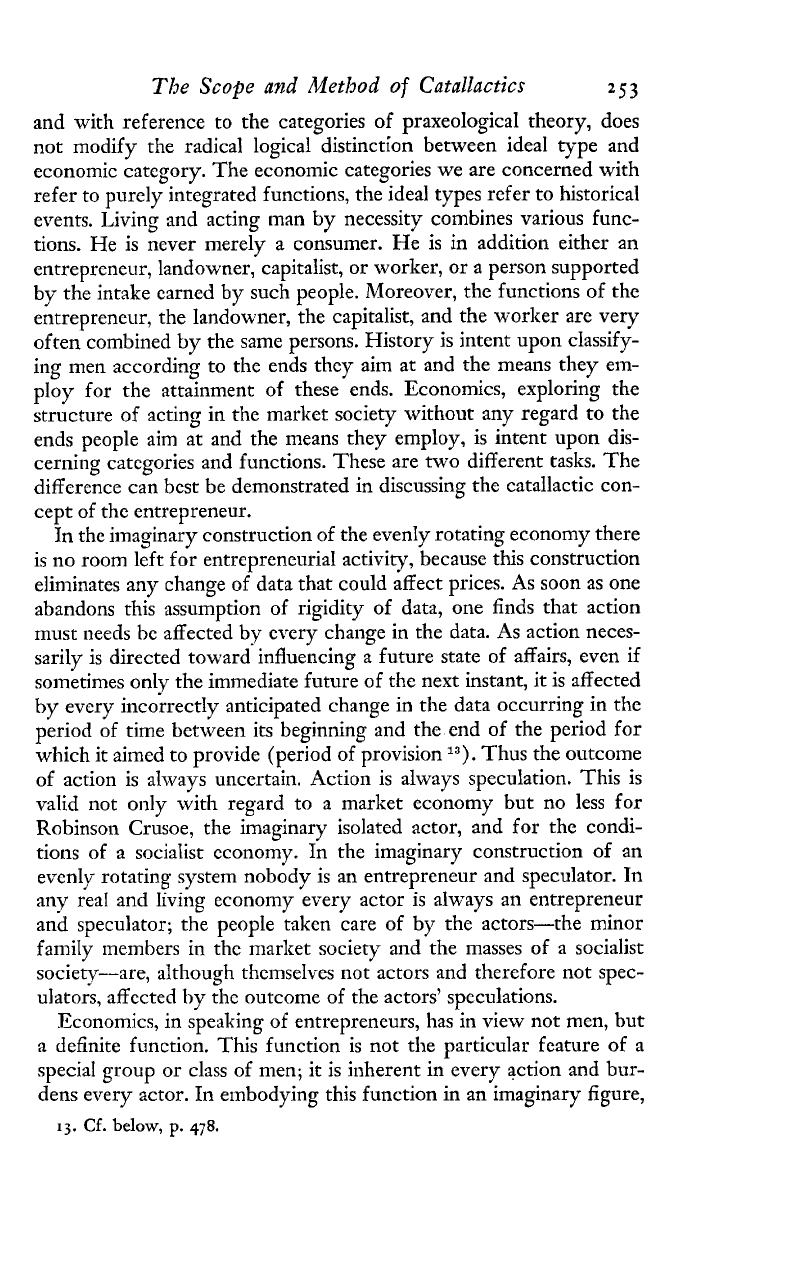
The
Scope
and
Metbod of
Catallactics
and with reference to the categories of praxeological theory, does
not modify the radical logical distinction between ideal type and
economic category. The economic categories we are concerned with
refer to purely integrated functions, the ideal types refer to historical
events. Living and acting man by necessity combines various func-
tions. He is never merely a consumer. He is in addition either an
entrepreneur, landowner, capitalist, or worker, or a person supported
by
the intake earned by such people. Moreover, the functions of the
entrepreneur, the landowner, the capitalist, and the worker are very
often combined by the same persons. History is intent upon classify-
ing men according to the ends they aim at and the means they em-
ploy for the attainment of these ends. Economics, exploring the
structure of acting in the market society without any regard to the
ends people aim at and the means they employ, is intent upon dis-
cerning categories and functions. These are two different tasks. The
difference can best be demonstrated in discussing the catallactic con-
cept of the entrepreneur.
In the imaginary construction of the evenIy rotating economy there
is no room left for entrepreneurial activity, because this construction
eliminates any change of data that could affect prices. As soon as one
abandons this assumption of rigidity of data, one finds that action
must needs be affected by every change in the data. As action neces-
sarily is directed toward influencing a future state of affairs, even if
sometimes only the immediate future of the next instant, it is affected
by
evcry incorrectly anticipated change in the data occurring in the
period of time between its beginning and the end of the period for
which it aimed to provide (period of provision
13).
Thus the outcome
of action is always uncertain. Action is always speculation. This is
valid not only with regard to a market economy but no less for
Robinson Crusoe, the imaginary isolated actor, and for the condi-
tions of a socialist economy. In the imaginary construction of an
evenly rotating system nobody is an entrepreneur and speculator. In
any reai and iiving economy every actor is aiways an entrepreneur
and speculator; the people taken care of by the actors-the minor
family members in the market society and the masses of a socialist
society--are, although themselves not actors and therefore not spec-
ulators, affected
by
the outcome of the actors' speculations.
Economics, in speaking of entrepreneurs, has in view not men, but
a definite function. This function is not the particular feature of a
special group or class of men; it is inherent in every action and bur-
dens every actor. In embodying this function in an imaginary figure,
13.
Cf.
below,
p.
478.
